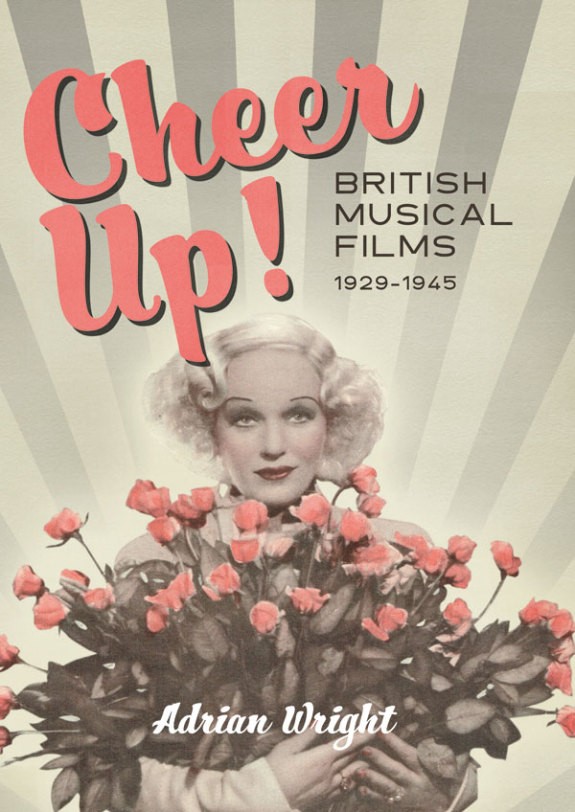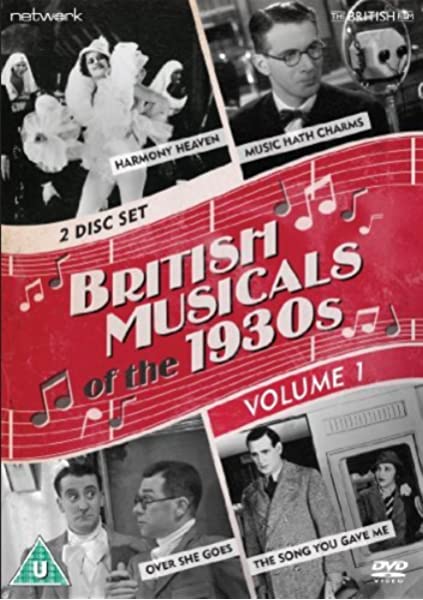John Groves
Operetta Research Center
22 June, 2020
In a preface to Cheer Up! British Musical Films 1929-1945, author Adrian Wright tells us that British Film Studios made more than 320 musical films between the advent of the ‘talkies’ in 1929 and 1945. He goes on to say that he has spent too many years looking for a book about them that is ‘not only informative but attempts a long overdue critical reassessment of the genre’. This is what he attempts to do, and he does it very well! He has an easy prose style that is very readable – I found myself searching the excellent index in order to read about one film and was lured into reading about the next one, and the next!

Gitta Alpar on the cover of “Cheer Up! British Musical Films 1929-1945.” (Photo: Boydell and Brewer)
Mr. Wright, sensibly, uses a chronological order of release, year by year, month by month, with the films dealt with listed at the beginning of each chapter in order. He then gives a brief synopsis, lists the principal members of the cast, quotes contemporary reviews and also gives his own, often rather blunt, opinions, where he has been able to actually see the film in question.
This has not always been possible as many have not been released either on DVD or VHS (‘what was that?’ I hear anyone under 40 cry), but luckily 24 have been released on DVD in an inexpensive series called British Film Musicals of the 1930s and others, such as those by Cecily Courtneidge, Jack Hulbert, Richard Tauber, George Formby, Gracie Fields have also been available. In addition, in the UK, Freeview Channel 81 Talking Pictures spends much of its time re-running British films.

Volume 1 of “British Musicals of the 1930s.”
One of the first European operettas to find its way into British cinemas was Millöcker’s Bettelstudent as The Beggar Student, released in December 1931. Clearly Mr. Wright has been able to discover little about this film as it is given less than half a page, whereas the same composer’s I Give My Heart / The Dubarry (November 1935) gets twice as much.
The author describes this film as ‘ravishing’, and he is quite correct: sumptuous costumes and settings, plus hoards of extras aid the wonderfully charismatic Gitta Alpar, who sings most of the music do full justice to the show. It is available in British Musicals volume 6 in a superb transfer.
Her November 1936 release Everything in Life, with ‘pleasant’ music by Hans May, was by no means as successful, we are told. The same British Musicals volume includes Joseph Schmidt in June 1936’s A Star Fell from Heaven, also with music by Hans May, who had a hand in many British Film Studios musicals from 1929 until his death 30 years later. Wright calls this an ‘unexpected delight…..anticipates Singin’ in the Rain’.
May’s music is described as ‘competent,’ and with regard to Schmidt ‘the temperature drops when (he) stops singing and begins acting.’ Which is true. (For more information on Hans May and his stage/screen operettas, click here.)
Unfortunately the transfer of this film to DVD is not as successful as some, the sound distorting unpleasantly in the songs. May also composed the music for Waltz Time (July 1945) starring Anne Ziegler and Webster Booth with a guest appearance of Richard Tauber. ‘May’s … scores … are an uneven jumble … often mediocre … often imaginative’ (says Geoff Brown in a quote).

Poster for the movie “Waltz Time” starring Richard Tauber. It promises to be “naughty, immoral, and illegal”!
Other films of operettas dealt with include Ball at The Savoy (January 1936) which is described as ‘slow, tortuous’, then there is another Waltz Time from June 1933 (A. P. Herbert’s take on Die Fledermaus), Stolz’ Two Hearts in Waltz Time (April 1934), Blossom Time with Tauber (August 1934 / BM volume 2), Lilac Domino (July 1937) which is ‘devoid of the slightest pretence of realism,’ and there is The Mikado (January 1939) as a ‘visual treat’ that’s ‘luscious’.
April 1937 saw the release of Ivor Novello’s Glamorous Night (BM volume 5), starring the American Mary Ellis reprising her stage role; she only died in 2003. Adrian Wright clearly does not like this film (I confess: I do!), but neither did the critics of the time!
Miss Ellis is described as ‘a gypsy who went to Roedean [the girls’ UK Public School on the cliffs near Brighton]’ and ‘[Ellis] sings almost condescendingly’. The shipwreck scene, which was the Act One highlight of the stage production at Drury Lane, was omitted from the film. Olive Gilbert’s role is reduced to a walk-on, and Elisabeth Welch’s part and songs are cut!
If, perhaps, British films of operettas were not always successful, many others were. Lupino Lane, remembered today for Lambeth Walk (April 1939), a ‘corny’ version of the stage success Me and My Girl, achieved greatest success in his earlier musical films. Both Happy (February 1934 / BM volume 5) and Over She Goes (August 1937 / BM volume 1) Wright calls ‘the cleverest of the decade and certainly … the most stylish’. I can only agree, one of the reasons being that both retained important members of the original stage casts.
Dance band leaders queued up to be in films, one of the best being Music Hath Charms (October 1935 / BM volume 1) in which Henry Hall and the BBC Dance Orchestra take hundreds of children from London into the countryside for a picnic – because it is Hall’s birthday!

Author Adrian Wright. (Photo: Boydell and Brewer)
Wright thinks that it ‘seems slightly forced in its jollity’, perhaps owing to it having four directors. Even though the dialogue may ‘border on the embarrassing’, especially as few of the protagonists can act, it is a typically British, warm-hearted, life-affirming 86 minutes – at least I (!) think so.
The undoubted highlight is when the Dance Orchestra find themselves stranded in the countryside and have to commandeer various modes of transport so that they can return to Broadcasting House in time for their live daily programme at 5.15 pm. Hall composed Just Little Bits and Pieces in which the band gradually join as they rush into the studio, each player being showcased.
The title of the book Cheer Up! is taken from a Stanley Lupino film released in February 1934, with a storyline that was ‘absurd, naïve and unoriginal … shambolic choreography’ but with ‘one of the nicest scores of the decade’.
Adrian Wright’s 379 page tome has certainly cheered me up. It is a book which, since it arrived, I have been continually been dipping into, and once dipped, have continued reading for hours followed by watching one of the films I have read about, or searching out recordings of the various songs.
It is invaluable for anyone who has an interest in films, musicals and operetta, and the research which must have been undertaken is very commendable. There are 30 black and white illustrations, mainly of sheet music covers, a copious bibliography, a general index and an index of films covered. Very highly recommended – especially at the modest asking price of £30.00!

This review has really made me keen to buy this book. I agree with John Groves that Gitta Alpar in the film “I Give My Heart” is wonderful – it’s one of my favourite British operetta films. She not only sings sensationally, but she is so full of life – just what we need in these present grim times!